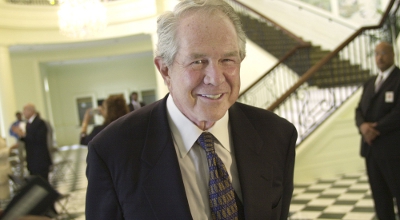Pat Robertson Says Alzheimer’s Is Acceptable Excuse for Divorce
Till death do us part?
What is death? Pat Robertson, host of The 700 Club, shocked viewers this week when he said Alzheimer’s disease is a kind of death, and is grounds for acceptable divorce.
The once-Baptist minister was responding to a viewer inquiry:
“I have a friend whose wife suffers from Alzheimer’s. She doesn’t even recognize him anymore, and, as you can imagine, the marriage has been rough. My friend has gotten bitter at God for allowing his wife to be in that condition, and now he’s started seeing another woman. He says that he should be allowed to see other people, because his wife as he knows her is gone … I’m not quite sure what to tell him. Please help.”
Admitting it was a tough decision at hand, Robertson leaned in agreement with the viewer’s friend: “I hate Alzheimer’s. It is one of the most awful things because, here is a loved one, this is the woman or man that you have loved for 20, 30, 40 years and suddenly, that person is gone. They’re gone. They are gone. So, what he says, basically, is correct.”
“I know it sounds cruel,” Robertson continued, “but if he’s going to do something he should divorce her and start all over again.”
Feathers are ruffled in the religious community at Robertson, who never referred to Scripture in his advice.
Joel Hunter, senior pastor of Northland Church in Orlando, Fla., is outraged that Robertson would symbolically compare Alzheimer’s disease to death. “Obviously, you could do this for anything,” Hunter told ABC News. “My husband watches and plays video games, and so he has left the marriage and it’s kind of like a death. It’s not death, and so we can’t start describing things as death that are really not death, and we have to stop trying to mischaracterize what Scripture says for our own convenience.”
Although the disease deteriorates many areas of a person’s life and the lives of relatives, Dr. Robert Stern of Boston University School of Medicine told ABC News: “The feelings are the last to go. The ability to connect on some level—that’s the very last thing to go. Person may not remember their loved one’s name, they may not be able to remember what happened a couple of minutes ago, but they still can connect.”
Many who experience loved ones having the disease take on the character of Noah in The Notebook, visiting every day, loving every day, supporting every day, waiting for his/her spouse to come back.
“What we see when people get diagnosed is families rallying around the person like they would with any fatal or serious illness,” reports Beth Kallmyer of the Alzheimer’s Association.
Regardless of biblical correctness of the situation, David Loewenstein, a clinical neuropsychologist at University of Miami’s Miller School of Medicine, told ABC News, “I think this highlights the need for couples and families to have discussions early in any illness, and preferably before illness strikes so that person’s decisions and preferences are known and respected.”
Do you agree with Robertson?







































